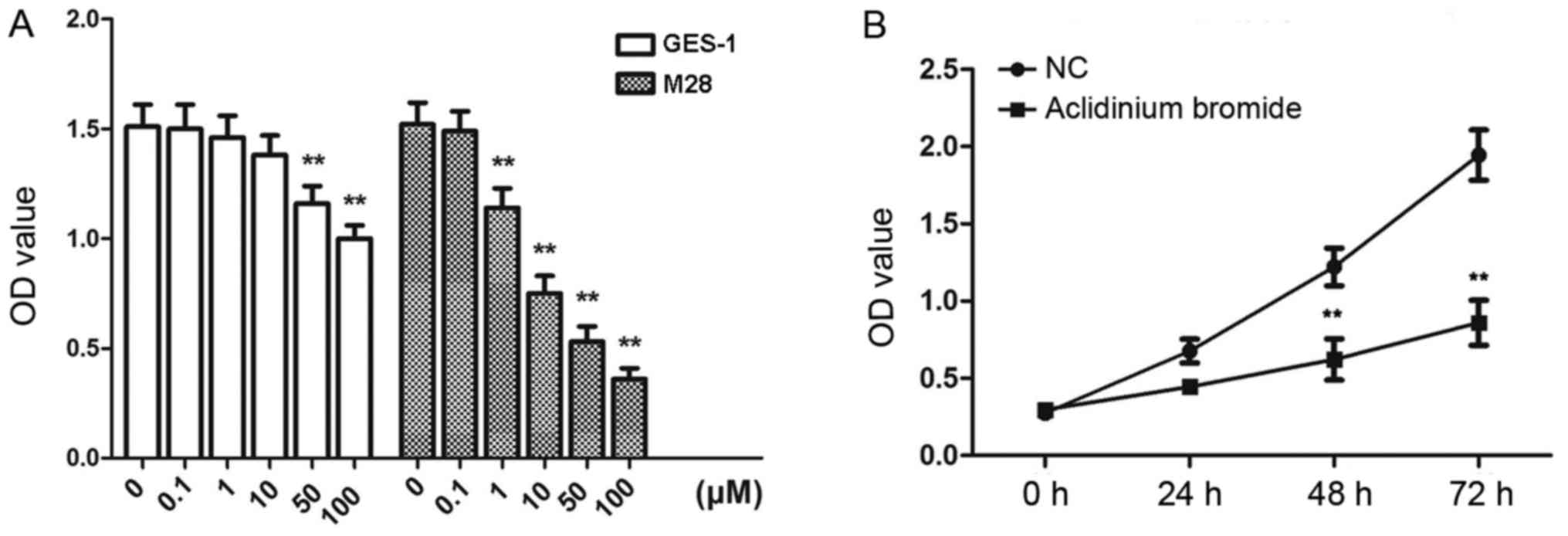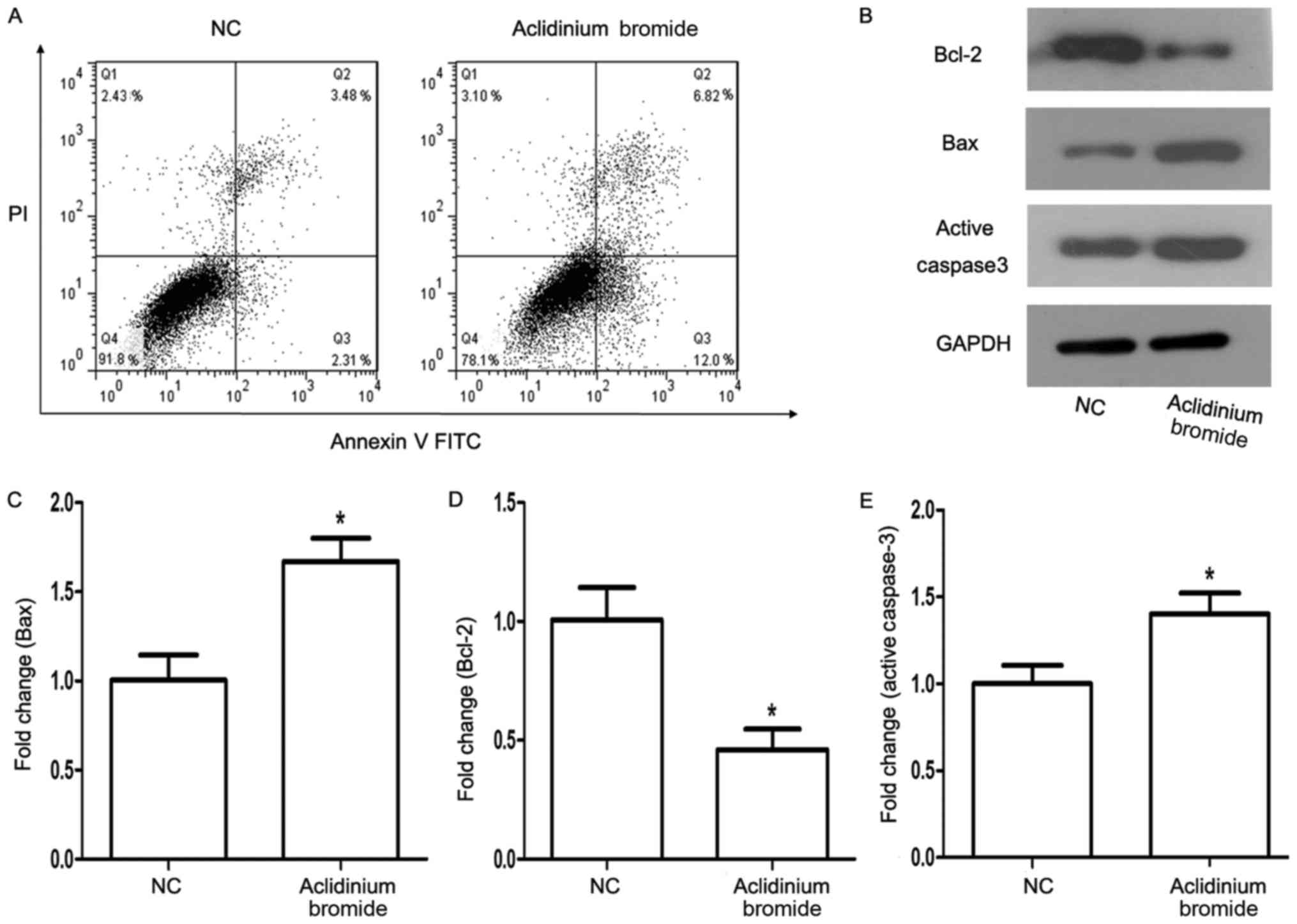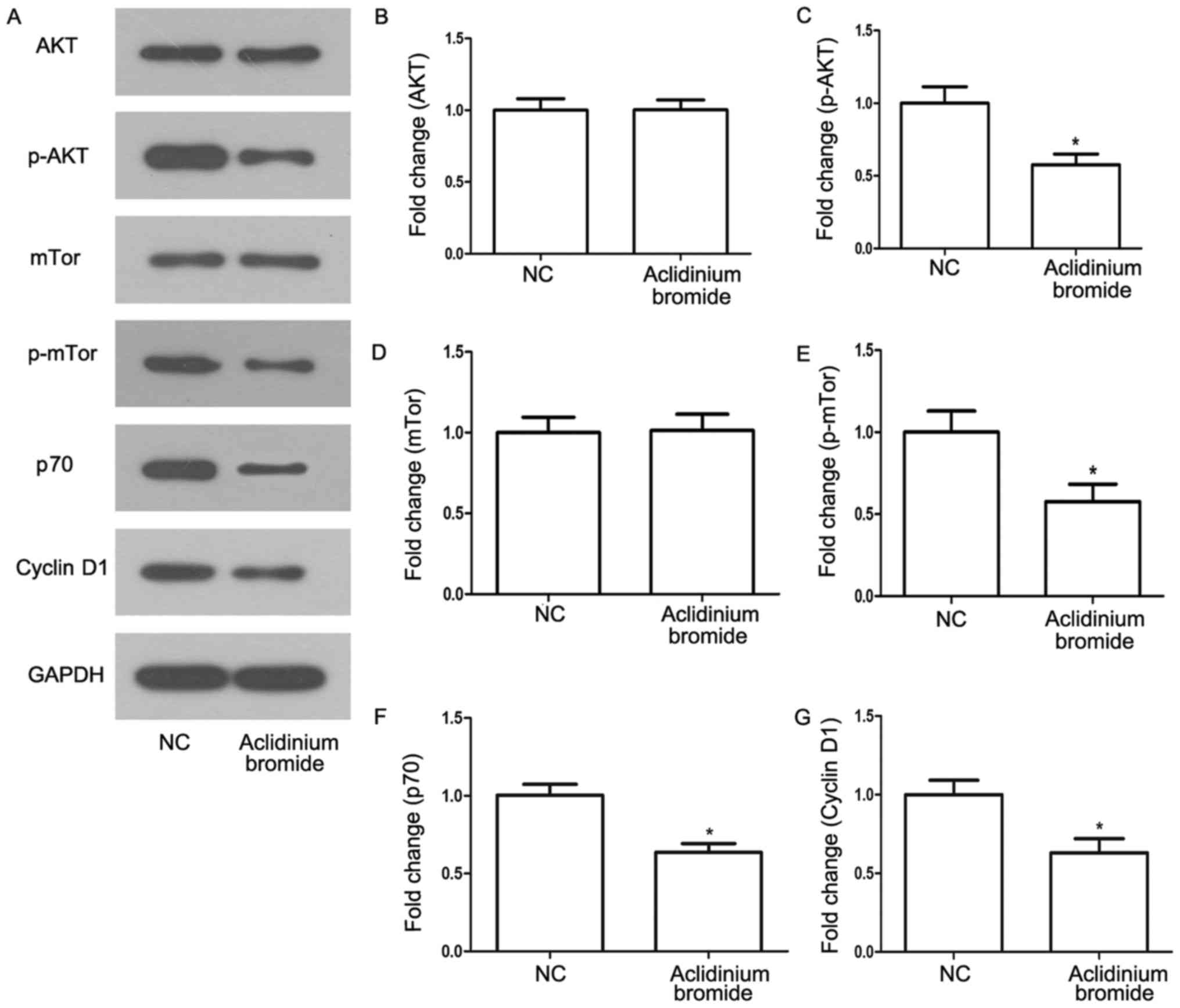|
1
|
Torre LA, Bray F, Siegel RL, Ferlay J,
Lortet-Tieulent J and Jemal A: Global cancer statistics, 2012. CA
Cancer J Clin. 65:87–108. 2015. View Article : Google Scholar : PubMed/NCBI
|
|
2
|
Lochhead P and El-Omar EM: Molecular
predictors of gastric neoplastic progression. Cancer Cell. 33:9–11.
2018. View Article : Google Scholar : PubMed/NCBI
|
|
3
|
Cazzola M, Calzetta L, Page CP, Rogliani
P, Facciolo F, Gavaldà A and Matera MG: Pharmacological
characterization of the interaction between aclidinium bromide and
formoterol fumarate on human isolated bronchi. Eur J Pharmacol.
745:135–143. 2014. View Article : Google Scholar : PubMed/NCBI
|
|
4
|
Ami N, Koga K, Fushiki H, Ueno Y, Ogino Y
and Ohta H: Selective M3 muscarinic receptor antagonist inhibits
small-cell lung carcinoma growth in a mouse orthotopic xenograft
model. J Pharmacol Sci. 116:81–88. 2011. View Article : Google Scholar : PubMed/NCBI
|
|
5
|
Wang L, Zhi X, Zhang Q, Wei S, Li Z, Zhou
J, Jiang J, Zhu Y, Yang L, Xu H and Xu Z: Muscarinic receptor M3
mediates cell proliferation induced by acetylcholine and
contributes to apoptosis in gastric cancer. Tumour Biol.
37:2105–2117. 2016. View Article : Google Scholar : PubMed/NCBI
|
|
6
|
Tang Y and Le W: Differential roles of M1
and M2 microglia in neurodegenerative diseases. Mol Neurobiol.
53:1181–1194. 2016. View Article : Google Scholar : PubMed/NCBI
|
|
7
|
Gentry PR, Kokubo M, Bridges TM, Cho HP,
Smith E, Chase P, Hodder PS, Utley TJ, Rajapakse A, Byers F, et al:
Discovery, synthesis and characterization of a highly muscarinic
acetylcholine receptor (mAChR)-selective M5-orthosteric antagonist,
VU0488130 (ML381): A novel molecular probe. ChemMedChem.
9:1677–1682. 2014.PubMed/NCBI
|
|
8
|
Tully BT, Li M, Sun Y, Berkowitz J and
Chai TC: Defects in muscarinic receptor cell signaling in bladder
urothelial cancer cell lines. Urology. 74:467–473. 2009. View Article : Google Scholar : PubMed/NCBI
|
|
9
|
Bateman ED, Chapman KR, Singh D, D'Urzo
AD, Molins E, Leselbaum A and Gil EG: Aclidinium bromide and
formoterol fumarate as a fixed-dose combination in COPD: Pooled
analysis of symptoms and exacerbations from two six-month,
multicentre, randomised studies (ACLIFORM and AUGMENT). Respir Res.
16:922015. View Article : Google Scholar : PubMed/NCBI
|
|
10
|
Melani AS: Long-acting muscarinic
antagonists. Expert Rev Clin Pharmacol. 8:479–501. 2015. View Article : Google Scholar : PubMed/NCBI
|
|
11
|
von Rosenvinge EC, Cheng K, Drachenberg
CB, Fowler CB, Evers DL, Xie G and Raufman JP: Bedside to bench:
role of muscarinic receptor activation in ultrarapid growth of
colorectal cancer in a patient with pheochromocytoma. Mayo Clin
Proc. 88:1340–1346. 2013. View Article : Google Scholar : PubMed/NCBI
|
|
12
|
Xu ZP, Song Y, Yang K, Zhou W, Hou LN, Zhu
L, Chen HZ and Cui YY: M3 mAChR-mediated IL-8 expression through
PKC/NF-κB signaling pathways. Inflamm Res. 63:463–473. 2014.
View Article : Google Scholar : PubMed/NCBI
|
|
13
|
Spindel ER: Muscarinic receptor agonists
and antagonists: Effects on cancer. Handb Exp Pharmacol. 451–468.
2012. View Article : Google Scholar : PubMed/NCBI
|
|
14
|
Ehlert FJ, Pak KJ and Griffin MT:
Muscarinic agonists and antagonists: Effects on gastrointestinal
function. Handb Exp Pharmacol. 343–374. 2012. View Article : Google Scholar : PubMed/NCBI
|
|
15
|
Lombardi MG, Negroni MP, Pelegrina LT,
Castro ME, Fiszman GL, Azar ME, Morgado CC and Sales ME:
Autoantibodies against muscarinic receptors in breast cancer: Their
role in tumor angiogenesis. PLoS One. 8:e575722013. View Article : Google Scholar : PubMed/NCBI
|
|
16
|
Trkulja V, Crljen-Manestar V, Banfic H and
Lackovic Z: Involvement of the peripheral cholinergic muscarinic
system in the compensatory ovarian hypertrophy in the rat. Exp Biol
Med (Maywood). 229:793–805. 2004. View Article : Google Scholar : PubMed/NCBI
|
|
17
|
Pagès G, Durivault J, Hannoun-Levi JM,
Viera A and Ortholan C: 45 POSTER VEGF targeting increases the
cystostatic effect of docetaxel on prostate and breast tumor cells;
a new interpretation of the therapeutic effect. Eur J Cancer
Supplements. 6:182008. View Article : Google Scholar
|
|
18
|
Li D, Wei X, Ma M, Jia H, Zhang Y, Kang W,
Wang T and Shi X: FFJ-3 inhibits PKM2 protein expression via the
PI3K/Akt signaling pathway and activates the mitochondrial
apoptosis signaling pathway in human cancer cells. Oncol Lett.
13:2607–2614. 2017. View Article : Google Scholar : PubMed/NCBI
|
|
19
|
Xu R, Shang C, Zhao J, Han Y, Liu J, Chen
K and Shi W: Activation of M3 muscarinic receptor by acetylcholine
promotes non-small cell lung cancer cell proliferation and invasion
via EGFR/PI3K/AKT pathway. Tumour Biol. 36:4091–4100. 2015.
View Article : Google Scholar : PubMed/NCBI
|
|
20
|
Zhang X, Shi H, Tang H, Fang Z, Wang J and
Cui S: miR-218 inhibits the invasion and migration of colon cancer
cells by targeting the PI3K/Akt/mTOR signaling pathway. Int J Mol
Med. 35:1301–1308. 2015. View Article : Google Scholar : PubMed/NCBI
|
|
21
|
Arrighi N, Bodei S, Zani D, Michel MC,
Simeone C, Cunico Cosciani S, Spano P and Sigala S: Different
muscarinic receptor subtypes modulate proliferation of primary
human detrusor smooth muscle cells via Akt/PI3K and map kinases.
Pharmacol Res. 74:1–6. 2013. View Article : Google Scholar : PubMed/NCBI
|
|
22
|
Cabadak H, Aydin B and Kan B: Regulation
of M2, M3, and M4 muscarinic receptor expression in K562 chronic
myelogenous leukemic cells by carbachol. J Recept Signal Transduct
Res. 31:26–32. 2011. View Article : Google Scholar : PubMed/NCBI
|
|
23
|
Raufman JP, Cheng K, Saxena N, Chahdi A,
Belo A, Khurana S and Xie G: Muscarinic receptor agonists stimulate
matrix metalloproteinase 1-dependent invasion of human colon cancer
cells. Biochem Biophys Res Commun. 415:319–324. 2011. View Article : Google Scholar : PubMed/NCBI
|
|
24
|
Parnell EA, Calleja-Macias IE, Kalantari
M, Grando SA and Bernard HU: Muscarinic cholinergic signaling in
cervical cancer cells affects cell motility via ERK1/2 signaling.
Life Sci. 91:1093–1098. 2012. View Article : Google Scholar : PubMed/NCBI
|
|
25
|
Xu Y, Wang S, Chan HF, Lu H, Lin Z, He C
and Chen M: Dihydromyricetin induces apoptosis and reverses drug
resistance in ovarian cancer cells by p53-mediated downregulation
of survivin. Sci Rep. 7:460602017. View Article : Google Scholar : PubMed/NCBI
|
|
26
|
Zhao Q, Gu X, Zhang C, Lu Q, Chen H and Xu
L: Blocking M2 muscarinic receptor signaling inhibits tumor growth
and reverses epithelial-mesenchymal transition (EMT) in non-small
cell lung cancer (NSCLC). Cancer Biol Ther. 16:634–643. 2015.
View Article : Google Scholar : PubMed/NCBI
|
|
27
|
Cesario A, Russo P, Nastrucci C and
Granone P: Is α7-nAChR a possible target for lung cancer and
malignant pleural mesothelioma treatment? Current drug targets.
13:688–694. 2012. View Article : Google Scholar : PubMed/NCBI
|
|
28
|
Zhao R, Chen M, Jiang Z, Zhao F, Xi B,
Zhang X, Fu H and Zhou K: Platycodin-D induced autophagy in
non-small cell lung cancer cells via PI3K/Akt/mTOR and MAPK
signaling pathways. J Cancer. 6:623–631. 2015. View Article : Google Scholar : PubMed/NCBI
|
|
29
|
Yuan L, Wei S, Wang J and Liu X:
Isoorientin induces apoptosis and autophagy simultaneously by
reactive oxygen species (ROS)-related p53, PI3K/Akt, JNK, and p38
signalin pathways in HepG2 cancer cells. J Agric Food Chem.
62:5390–5400. 2014. View Article : Google Scholar : PubMed/NCBI
|


















